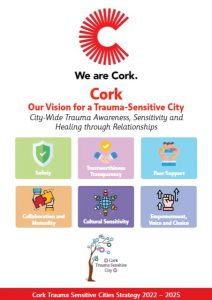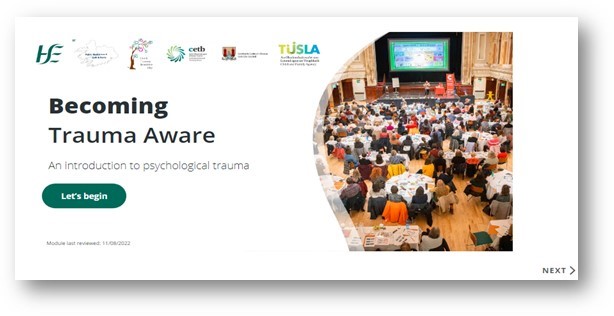Cork Trauma Sensitive City
Cork city is the first Irish city to have established an inter-agency Trauma Sensitive Forum Steering Group (Chaired by Cork City Council) with representation across the community & voluntary sector, HSE, TUSLA, Academia (UCC & MTU), An Gardaí, ETB, Social Protection, City Council, School Completion, Probation, Addiction services and Area Based childhood services.
A city-wi de strategy document underpins this initiative. Click here to access.
de strategy document underpins this initiative. Click here to access.
An inter-agency eLearning training module on Becoming Trauma Aware has been co-produced through joint funding and this module is promoted across organisational settings. The eLearning module was commissioned and funded by the HSE Public Health Department (Cork & Kerry), by Cork City Council (CCC), Cork Education & Training Board (CETB) and TUSLA the Child & Family Agency.

Both programme, video and animation content for the e-Learning module was reviewed by subject area experts in the area of developmental, psychological and war trauma – with content contributed generously by
- Dr Sharon Lambert, UCC
- Dr Judith Butler, MTU
- Dr Jennifer Hayes, HSE
- Sandra Cogan-Williamson, CCC and
- Katherine Harford, Manager of Lets Grow Together
Video content was also provided by
- Maura Fennessey – Cork School Principal from the educator’s perspective and trauma-responsive education.
- The Two Norries – James & Leonard – of the incredibly successful Two Norries podcast who share their personal lived experience with trauma.
- Marion Rackard – Retired healthcare worker and Founder of Alcohol Action Ireland and The Silent Voices Campaign who shares her own lived experience.
So – What will learners achieve/gain upon completion of the Trauma module?
Learners will be able to recognise what is meant by trauma, that trauma does not discriminate and is everybody’s responsibility. They will be able to identify the nature of trauma, its major forms and cause as well as understand how trauma affects the workings of the brain and the body and impact long term holistic health. Most importantly, learners will appreciate the importance of relationships and the potential to mitigate trauma’s effects.
The Aim of programme: is to raise general awareness of the impact of psychological trauma and help us all understand how trauma is everyone’s business. The audience for this module includes all staff at all levels working across all agencies. It’s a 45 minute module and includes an assessment and a certificate of completion.
The module is available to access on HSELanD – an online resource designed to support the training and development of staff working in the Irish health sector. Available to all health
professionals in the HSE, and those in voluntary and non-governmental organisations (NGOs), it can accessed by registering at www.hseland.ie. A Certificate of completion is available.
For those organisations and members of the public that cannot access HSELanD, the resource is also available to access on the Cork City Council website at the following link.
The Government of Ireland report prepared by the Department of Health – Sharing the Vision ~ A Mental Health Policy for Everyone gives a very clear mandate regarding the provision of a Trauma-Informed Service Delivery Principle and specifically states that staff in every part of the organisation change their language, behaviour and policies to take into consideration the experiences of those who have trauma histories, including staff members themselves.
According to Dr Anne Sheahan – Area Director of Public Health (Cork & Kerry)
Taking a Public Health approach to trauma requires many elements such as creating greater awareness, actively committing to prevention approaches, investing in early interventions, reducing stigma and most importantly; working in partnership and developing a shared approach. Cork City is leading the way in as the first City to recognise the benefits to the whole population in becoming trauma aware.
Trauma informed front-line services are essential particularly so for the new shape of society and life post-COVID. We can all, in our interactions with service users induce or reduce trauma. There is a need now more than ever for our frontline staff, employees and volunteers to deliver services with empathy and understanding for all service users.
